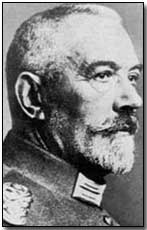Primary Documents - Theobald von Bethmann-Hollweg on the Prospect of War with the U.S., April 1917
 Reproduced below is the
text of German Chancellor
Theobald von Bethmann-Hollweg's
response to news that U.S. President
Woodrow Wilson was to
appear
before the U.S. Congress on 2 April 1917 to seek authorisation
for a
declaration of war with Germany.
Reproduced below is the
text of German Chancellor
Theobald von Bethmann-Hollweg's
response to news that U.S. President
Woodrow Wilson was to
appear
before the U.S. Congress on 2 April 1917 to seek authorisation
for a
declaration of war with Germany.
In his response von Bethmann-Hollweg reiterated the German view that war with America was avoidable and that the former's decision to renew a policy of unrestricted submarine warfare was only taken in response to Britain's continued "illegal and indefensible" naval blockade of Germany.
He concluded by stating that while Germany regretted the possibility of war with the U.S., it would yet overcome the setback.
Click here to read Britain's response to Bethmann-Hollweg's note.
German Chancellor Theobald von Bethmann-Hollweg on the Prospect of War with the U.S., April 1917
The directors of the American Nation have been convened by President Wilson for an extraordinary session of Congress in order to decide the question of war or peace between the American and German Nations.
Germany never had the slightest intention of attacking the United States of America, and does not have such intention now. It never desired war against the United States of America and does not desire it today.
How did these things develop? More than once we told the United States that we made unrestricted use of the submarine weapon, expecting that England could be made to observe, in her policy of blockade, the laws of humanity and of international agreements
This blockade policy, this I expressly recall, has been called illegal and indefensible by President Wilson and Secretary of State Lansing.
Our expectations, which we maintained during eight months, have been disappointed completely. England not only did not give up her illegal and indefensible policy of blockade, but uninterruptedly intensified it.
England, together with her allies, arrogantly rejected the peace offers made by us and our allies and proclaimed her war aims, which aim at our annihilation and that of our allies.
Then we took unrestricted submarine warfare into our hands; then we had to for our defence.
If the American Nation considers this a cause for which to declare war against the German Nation with which it has lived in peace for more than 100 years, if this action warrants an increase of bloodshed, we shall not have to bear the responsibility for it.
The German Nation, which feels neither hatred nor hostility, against the United States of America, shall also bear and overcome this.
Source: Source Records of the Great War, Vol. V, ed. Charles F. Horne, National Alumni 1923
Both British and German fleets had around 45 submarines available at the time of the Battle of Jutland, but none were put to use.
- Did you know?
